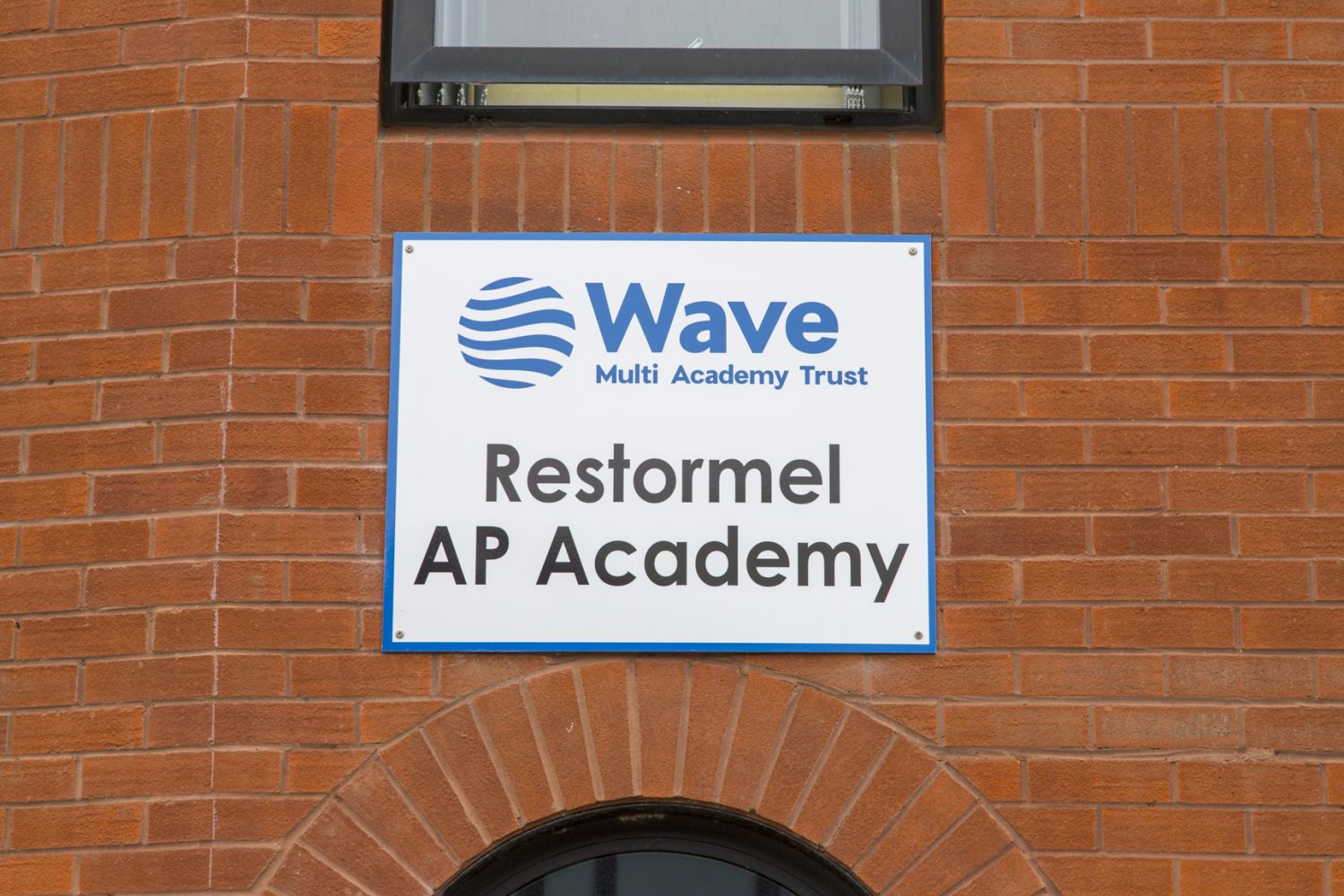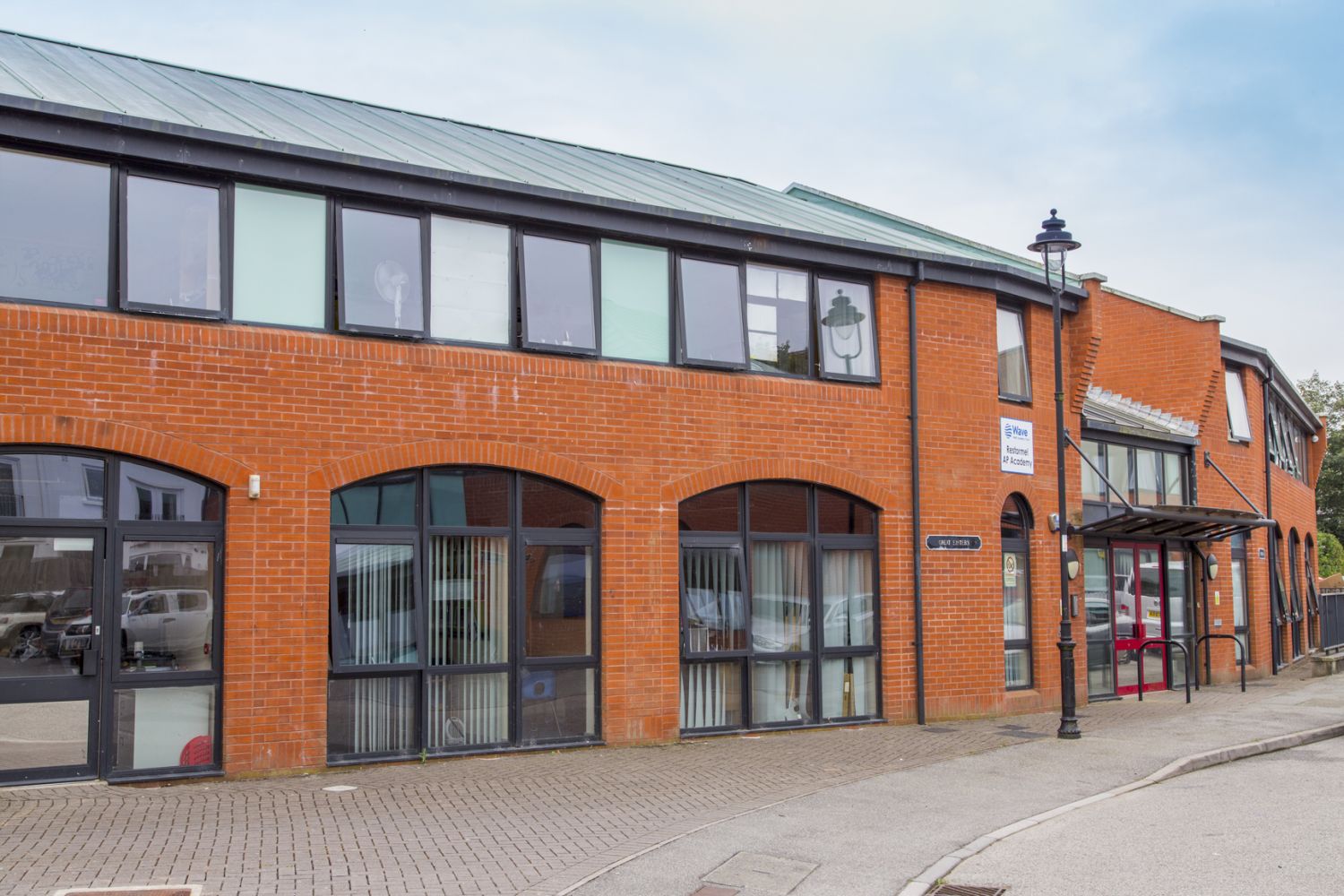
Get in Touch
- Academy Type: Alternative Provision (AP) Academy
- Principal & Main Contact: Head of School - Gemma Phillips
- Senior Administrator: Sarah Knowles
-
Designated Safeguarding Lead:
Dee Elding -
- Deputy Designated Safeguarding Lead: Janine Nelson -
- SENCO: Sarah Winstone -
- Careers Leader: Janine Nelson -
- Address: Great Eastern and Great Western, Brunel Business Park, St Austell, Cornwall, PL25 4TJ
- Phone: 01726 61003
- Email:
- Opening Times: Mon-Thu 0845-1430, Fri 0845-1300, 27.25 hours per week
About
About
Restormel Academy is based in St. Austell in Mid-Cornwall; a region that includes some of the most socially and economically deprived areas within Cornwall.
Restormel Academy provides a warm, caring and individualised learning experience for pupils whose behaviour has hindered their progress in mainstream school. We strive to re-engage our pupils with learning, by maintaining a calm working atmosphere, and supporting positive change in the way our pupils choose to behave. We provide places for those young people who have been permanently excluded from school, or who are on intervention programmes because of their behaviour.
Cornwall's Local Special Educational Needs & Disabilities Offer
Careers information:#
Restormel Provider Access Policy
Staff
Staff
Gemma Phillips
Head of School
Gemma graduated in 2011 from the University of Plymouth with a BSc (hons) in Criminology and Criminal Justice Studies. She then went on to work with offenders and their families, as well as creating educational opportunities within in a Prison setting. Following this Gemma worked with children and young people in a secondary school in Kent, launching an alternative provision setting. Gemma is currently studying a Masters in Advanced Child Protection with the University of Kent. She is passionate about safeguarding and supporting children and their families to ensure that everyone has different opportunities to be successful. Outside of work Gemma enjoys spending time with her family and friends.
Chris Denley
Executive Principal
Chris started teaching at Greendown Community School in Swindon in 1997 as a History teacher. He became Director of Vocational Provision, organising work-related learning before being appointed to the Leadership Team as Assistant Head with responsibility for Curriculum, Assessment and ICT. In 2008 he moved to West Penwith to become Deputy Head, and then Head of School, at Cape Cornwall School. He was a Specialist Leader in Education for Truro and Penwith Teaching School and supported schools across Cornwall in developing teaching and learning. He moved into alternative provision and set up an education provider with colleagues, before joining Wave and teaching with CHES. He has continued to support Teaching and Learning, working with Stansfield Academy, and was appointed Associate Principal with Wave, based at Penwith Academy, in January 2023.
Outside of work Chris has a family with three children. He enjoys playing guitar, cycling, running and surfing. He loves watching football with his sons who share his love for the mighty Swindon Town and Liverpool. He also enjoys watching rugby with his Dad, and supports Dings Crusaders from afar. He has recently completed his MA in History and is an Outreach Team member of the British Association for Local History. In his spare time, he is researching a book about working-class religious affiliation and leisure in Bristol the end of the Victorian period.
Janine Nelson
Vice Principal
Janine has been a teacher since 2013 and is now the Vice Principal at Restormel Academy. She earned a BA (Hons) in Philosophy and Religious Studies from the Open University in 2011 and completed her PGCE in Secondary Education (RE) at Marjon in 2013.
She began her teaching career at Helston Community College, teaching Religious Education and PSHE. She later became the Head of Progress for a year group of 250 students, overseeing their transition from Year 6 to Year 7, monitoring academic progress, providing pastoral support, managing behaviour, and working with external agencies to support students. During this time, Janine developed a strong interest in supporting students who found mainstream education challenging. She focused on meeting individual pupil needs and helping them succeed in a way that worked best for them.
In September 2023, Janine joined Penwith Academy as a Humanities and PSHE teacher before becoming the Subject Advisory Lead for Humanities within the trust. She prides herself on building positive relationships with pupils and ensuring they receive a high-quality education tailored to their needs.
Outside of work, Janine enjoys spending time with her husband, teenage daughters, and their cockapoo. She enjoys music festivals, concerts, crafting, reading and traveling.
Danielle Elding
Pastoral Support Manager
Dee has been working with adults and the elderly in care, mental health and social services settings for many years. Dee then moved on to fulfil her passion of working with young people. Over the last 8 years Dee has completed 3 degrees in: Health and Social Sciences, Psychological Therapies Practice (low intensity cognitive behavioural therapy) and Clinical Supervision. Most recently becoming a Clinical Supervisor for CY IAPT (Children and Young People’s Improving Access to Psychological Therapies). Dee is an accredited Children’s CBT Therapist with the BABCP. Her passion lies within mental health, psychology, safeguarding and early intervention for young people.
As Pastoral Support Manager, Dee will be able to incorporate all knowledge, skills, and experience into supporting pupils to become successful young adults. Dee prides herself on having positive relationships with the young people and families she works alongside. Outside of work Dee enjoys spending time with her children, going for walks with friends and going to the gym.
Sarah Winstone
SENCO
Following a BA Hons degree, Sarah gained a secondary PGCE in 2007 and worked in Plymouth, teaching English alongside Drama and Music. After completing a National Qualification for SENCOs, Sarah became Assistant Principal in a Devon School and held the roles of SENCO, DSL, Designated teacher for Children in Care and head of PSHE. Sarah values the opportunity to build successful and mutually respectful relationships with young people and believes this can bring about positive changes in pupils' engagement with education.
Following this role, Sarah worked for the Virtual School in Devon County Council, working closely with the 0-25 team to place students in appropriate educational provisions which could meet their myriad needs.
After a short break to support her young children in their own school beginnings, Sarah is now busy as SENCO at Restormel, while outside of Wave, Sarah runs an eco friendly gift and interiors business and delivers creative workshops. Sarah also enjoys spending time with family, friends and a very spoilt Jack Russell.
Academy Info
Academy Info
Curriculum
Our Curriculum at Restormel
Welcome to our curriculum section. From here, you can find out all about our overall curriculum intent at Wave Trust and within the Academy itself.. For more information about our different subject areas, please click on the Subject Areas tab on the left hand side menu.
Please download our curriculum intent statement below.
Restormel Curriculum Intent Statement
Documents
Subject Areas
Subject Areas

English

Science

PSHE

Humanities - Key Stage 3
In Humanities we study both Key Stage 3 Geography and Key Stage 3 History.
In our Geography sessions we look at the Structure of the Earth and the Tectonic Activity associated with it. We look at how the surface of the Earth is constantly shifting and study the dynamic, often catastrophic, effects of this constant movement. We analyse the way in which volcanoes are formed and predicted, how earth occur and are unpredictable, and how volcanoes and earthquakes can cause. These three tectonic events can, and often do, have a devastating effect on nearby settlements and environments. Students have the opportunity to analyse and compare case studies of tectonic related events in both developed and less developed countries.
In our History sessions we initially look at the birth of the Industrial Revolution and how it led to Britain building its empire. We look at the factory systems and working conditions at the time, and the improvements implemented to reduce illness and injury especially in children working in the mills and factories. We study the slave trade; the causes, effects and, ultimately, its abolition. Studying the British Empire leads us on to the causes and effects of World War One. We analyse the flashpoint that triggered the war but also the strengthening and the worsening of relationships leading to mounting mistrust between countries that contributed to the flashpoint. We then go on to research the “Joining up” campaign, the conditions in the trenches, the weapons and equipment and, finally, the end of the war.

BTEC Work Skills - Key Stage 4
In Years 10 and 11 it is necessary to focus on the future and the workplace. Applying for a job can be a daunting experience; from completing application forms and creating CVs to identifying the key elements of a job advertisement, knowing the difference between employment contracts and what an employment contract must contain. BTEC Work Skills is a suite of BTEC qualifications designed to equip students with the essential skills for job success and career development. The main purpose is to develop students’ employability skills. The structure of BTEC Work Skills is flexible and designed to support programmes that are student-led. We have chosen two units that best suit our programme and fit into the qualification that is the right size. The two units are internally assessed, and the assessments undertaken in a way that suits each student. Our BTEC Work Skills programme is designed to give students confidence when looking at job adverts and application forms, together with gaining an understanding of the important differences between employment contracts.
Unit 2: Selecting and Applying for a Job.
The aim of this unit is for students to consider how to find suitable job opportunities that match their skills and interests. The students will also explore how to present themselves and their skills in different types of application documents. Different employers in different job sectors will recruit people in a range of ways and this can be confusing. In applying for full, part-time or voluntary jobs, apprenticeships or placements students will need to know how and where these employers advertise their vacancies. It is also important to understand the key information that they should include when applying for different job opportunities and how to present this information in the right way to help them to be considered for the next stage in the recruitment process.
In this unit students will: identify their relevant skills and interests; know where job opportunities are advertised; identify the key information needed for an application; and how to present themselves, their experience and their skills in an application document.
By the end of the unit students should be: confident in identifying their own skills, qualities and experience; be able to efficiently search and select relevant job advertisements; present personal information and complete job application documentation.
Unit 3: Recognising Types of Employment Contract
The aim of this unit is for students to explore different ways employees can be contracted and consider the impact on individuals in the workplace.
There are many different types of employment contracts to reflect different employment statuses and it is important to know the key similarities and differences between them. Students need to be aware of their entitlements as an employee and the level of employment protection each type of contract provides. It is also important to consider how different ways of working will have an impact on the student’s life outside of work and how they might help them achieve long-term and short-term career goals. In this unit students look at different employment statuses, explore the benefits and potential issues of each and consider the types of contractual options that they might prefer.
In this unit students will: research different contracts and working patterns; analyse the advantages and disadvantages of different work opportunities and contracts; identify how work patterns can impact on mental and physical wellbeing.
By the end of the unit students should be developing skills in: establishing information when looking at adverts and employment contracts; information handling when comparing advertisements and employment contracts; appropriate communication skills when making enquiries regarding vacancies and employment contracts.

Maths
Student Data
Referrals
Referrals
Wave Multi Academy Trust work with the Local Authority regarding Referrals and placements at our Alternative Provision Academies. Please follow this link to Cornwall Education Welfare Services. Phone number 01872 324298 Email
Map
Map
Latest News
Latest News
-
Wave Trust Autumn Newsletter 2025
Here is our Wave Autumn 2025 Newsletter. Find out what we have been getting up to across the Trust this term.
Wave Trust Newsletter Autumn Term 2025
-
Glendinning Academy Named Lead School for Music!
We are thrilled to say that Wave Trust’s Glendinning Academy have been selected as a Lead School for Music by Devon Music Education Hub.
Glendinning is one of only three Special Educational Needs and Disabilities (SEND) schools across Devon to receive this prestigious recognition.
Read more here:
Glendinning Lead School for Music
-
Wave Summer newsletter 2025
Here is our Wave Summer 2025 Newsletter. Find out what we have been getting up to across the Trust this term.
Wave Trust Newsletter Summer Term 2025
-
Wave Spring Newsletter 2025
Here is our Wave Spring 2025 Newsletter. Find out what we have been getting up to across the Trust this term.
-
Wave Autumn Newsletter 2024
Here is our Wave Autumn 24 Newsletter. Find out what we have been getting up to across the Trust this term.
Online Lessons
Online Lessons
Term Dates & Events
Term Dates & Events
Wave Trust Term dates 2025-2026
Autumn Term
- Staff training day: Monday 1 & Tuesday 2 September 2025
- Term commences: Wednesday 3 September 2025
- Half Term: Monday 27 October to Friday 7 November 2025
- Term commences: Monday 10 November 2025
- Last day of term: Friday 19 December 2025
Spring Term
- Staff training day: Monday 5 & Tuesday 6 January 2026
- Term commences: Wednesday 7 January 2026
- Half Term: Monday 16 to Friday 20 February 2026
- Term commences: Monday 23 February 2026
- Last day of term: Thursday 2 April 2026
Summer Term
- Term commences: Monday 20 April 2026
- May Day Bank Holiday: Monday 4 May 2026
- Half Term: Monday 25 to Friday 29 May 2026
- Term commences: Monday 1 June 2026
- Staff training day: Monday 29 June 2026
- Last day of term: Thursday 23 July 2026
Wave Trust Term dates 2026-2027
Autumn Term
- Staff training day: Thursday 3 & Friday 4 September 2026
- Term commences: Monday 7 September 2026
- Half Term: Monday 26 October to Friday 6 November 2026
- Term commences: Monday 9 November 2026
- Last day of term: Friday 18 December 2026
Spring Term
- Staff training day: Monday 4 & Tuesday 5 January 2027
- Term commences: Wednesday 6 January 2027
- Half Term: Monday 15 to Friday 19 February 2027
- Term commences: Monday 22 February 2027
- Last day of term: Thursday 25 March 2027
Summer Term
- Term commences: Monday 12 April 2027
- May Day Bank Holiday: Monday 3 May 2027
- May Day Bank Holiday: Monday 31 May 2027
- Half Term: 1 June 2027 to Friday 4 June 2027
- Term commences: Monday 7 June 2027
- Staff training day: Monday 28 June 2027
- Last day of term: Friday 23 July 2027
Documents
Child Protection & Safeguarding Policy
Child Protection & Safeguarding Policy
Restormel Academy recognises that the safety and welfare of children is paramount and that we have a responsibility to protect children in all of our academy activities. We take all reasonable steps to ensure, through appropriate procedures and training, that all children, irrespective of sex, age, disability, race, religion or belief, sexual identity or social status, are protected from abuse.
We endeavour to provide a safe and welcoming environment where children are respected and valued. We are alert to the signs of abuse and neglect and follow procedures to ensure that children and young people receive effective support, protection and justice.
We listen to our pupils and take seriously whet they tell us, children are aware of the adults they can talk to if they have a concern. When there are concerns for a child's welfare, we may need to share information and work in partnership with other agencies. We will ensure concerns are discussed with parents/.carers first unless we have reason to believe that by doing so would be contrary to the child's welfare.
Our Child Protection and Safeguarding policy underpins and guides our safeguarding procedures and protocols.






